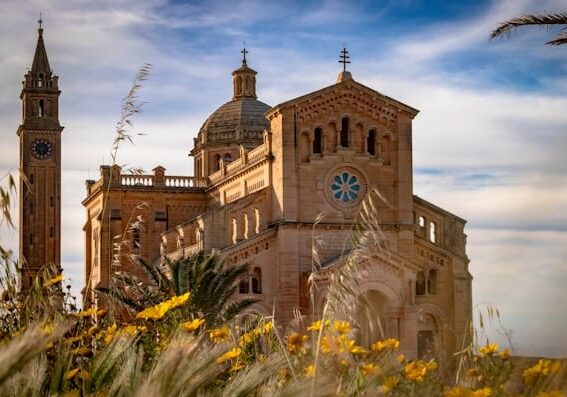
In this article, we’ll cover everything you need to know about immigrating to Malta, including:
• How to immigrate to Malta
• A comparison of different Malta immigration programs
• The cost of immigrating to Malta
• The Malta immigration process
• The benefits of living in Malta and more
Malta Immigration Pathways
Malta offers a variety of immigration options for applicants from across the globe. Finding the right Malta immigration program is essential to ensure you can meet the requirements and benefit from the program.
Malta Citizenship by Naturalization for Exceptional Services by Direct Investment (CES)
The Malta Citizenship by Naturalization for Exceptional Services by Direct Investment (CES) has a few steps with requirements at each stage to ensure applicants are meeting the required rigorous four-tier due diligence process to ensure the integrity of the applicants.
CES timeline
There are three stages in the Malta CES program process:
- Residency Application: Applicants must first pass a due diligence check to get a residency card. After approval, they need to visit Malta to submit biometric data. An apartment must be leased before applying.
- Citizenship Eligibility: Within 12 months of getting the residency card, applicants submit an eligibility application. After 120-150 days, if approved, they receive a Letter of Approval in Principle.
- Naturalization: After meeting all requirements, applicants take the Oath of Allegiance in Malta and receive citizenship, a passport, and a Certificate of Naturalization.
CES benefits
After acquiring Maltese citizenship, applicants receive a Maltese passport, offering numerous benefits, including visa-free travel to 170 countries. Additionally, applicants gain unlimited access to European Union countries, with the right to live, work, and study. These benefits rank the Malta passport in 34th place of the GCS Global Passport Index.
CES investment requirements

- Property options: Purchase a residential home in Malta worth at least €700,000 and retain it for at least five years OR lease a property for at least €16,000 per year for at least five years.
- Significant direct investment: If you have proof of residence in Malta for 36 months, you must donate €600,000 OR if you have proof of residence there for 12 months, you must contribute €750,000. (Additional €50,000 per dependent).
- Donation: A donation of €10,000 to a registered philanthropic, cultural, sport, scientific, or animal welfare non-governmental organization or society as approved by the Community Malta Agency.
CES fees
There are various fees required for the CES program, including:
- Residence Permit: €10,000 (deducted from final government contribution cost)
- Government Fees: €5,000 for the main applicant and €1,000 per dependent
- Residency Card Fees: €27.50 per applicant
- Due Diligence Fees: €15,000 for the main applicant, €15,000 for the benefactor (if applicable), and €10,000 per dependent aged 12 and above.
- Administrative Fees: €1,000 per applicant
Malta Permanent Residence Program (MPRP)
The Malta Permanent Residence Program (MPRP), offers non-European nationals a unique opportunity to obtain permanent residency in Malta through investment.
MPRP timeline
Once the application process begins, successful applicants can obtain permanent residency in Malta within 9 – 12 months, depending on the backlog and whether the application is completed in full.
MPRP benefits
The Malta Permanent Residence Program offers a range of benefits, including life-long residency, quick access to Europe, Asia, and Africa, and visa-free access to the Schengen Area.
MPRP investment requirements

- Property options: Lease a property for €14,000 OR purchase a property worth a minimum of €375,000. Either a leased or purchased property must be held for a period of at least 5 years.
- Maltese Government contribution: Make a €30,000 government contribution (if buying property) OR €60,000 (if renting property).
- Donation: Donate €2,000 to a registered local NGO.
To maintain the requirements of the MPRP, you must maintain the qualifying property for at least 5 years. Additionally, ensure you have valid travel documents and comprehensive health insurance coverage in Malta (Minimum €50,000).
MPRP fees
- Administrative fee: Pay a non-refundable administrative fee of €50,000.
- Dependents: An additional fee of €10,000 for a spouse, a parent, or a grandparent will apply if they are added after the initial approval.
- Residence card: €137.50 per person for the initial 5 years.
Malta Retirement Program
If you’re considering retiring in Malta, the Malta Retirement Program (MRP) is the official pathway for securing a retirement residence permit. This program provides a unique opportunity for European Union, EEA, Swiss, and non-EU nationals to retire in Malta.
Requirements
The following requirements must be met by applicants that want to retire in Malta:
- Be at least 55 years old
- Receive a pension income, with at least 75% remitted to Malta
- Own or lease a property in Malta (Purchase: €275,000 or €220,000 in Gozo and South of Malta) OR (Rent: €9,600 annually or €8,750 in Gozo and South of Malta)
- Have health insurance
Additionally, applicants of the Malta Retirement Program should not hold any other visas obtained through a residence program.
Malta Digital Nomad Visa
Malta introduced its Digital Nomad Visa program in 2021, joining other Eastern and Western European countries in offering visas for foreign nationals who work remotely or conduct business activities abroad.
The Malta Digital Nomad Visa grants non-EU, non-EEA, and non-Swiss individuals temporary residency for up to one year, allowing them to live on the island while working remotely with a stable internet connection, provided their employment is with a foreign company based outside Malta.
Requirements

- Show a minimum income of €42,000 a year.
- Be a non-EU, non-EEA, or non-Swiss national
- Be employed by a foreign company, be recognized as a partner in an organization outside Malta, or provide freelance or consulting services to foreign entities with proof of contract.
- Possess valid travel documents
- Have valid health insurance for the entire stay in Malta and provide proof of a health declaration
- Have a legal rental or purchase agreement for property in Malta
- Pass a background verification check
Malta Study Visa
Malta is a highly sought-after destination for higher education, attracting students from around the world with its prestigious colleges, stunning scenery, and top-notch educational facilities. For these reasons, many international students aspire to study in Malta.
Requirements

- EU Citizens: Do not need a visa. However, if the study program exceeds 90 days, they must apply for a long-term study permit from the Department of Citizenship and Expatriate Affairs.
- Non-EU Citizens: A student visa is not required for programs shorter than three months. For courses lasting more than 90 days, a temporary residence permit must be obtained upon arrival in Malta.
International students needing a Malta study visa should apply for one of the following Schengen visas:
- Schengen Type D Visa: A long-term permit for courses longer than three months.
- Schengen Type C Visa: A short-term permit for up to three months. If an extension is needed, students can apply for a temporary residence permit.
Malta Citizenship by Descent
For individuals with Maltese ancestry, Malta’s citizenship by descent program offers a special chance to reconnect with their heritage and enjoy the benefits of Maltese citizenship.
This program allows people to live in a country renowned for its beauty and welcoming community while also accessing the advantages of European Union membership.
Requirements
The Malta Citizenship by Descent program offers citizenship if one of your grandparents was born in Malta to parents who were also born there. Previously, citizenship by descent was limited to one generation until 2007. Subsequent amendments to the Citizenship Act enable second and later generations born abroad to obtain Maltese citizenship through registration.
Benefits of Immigrating to Malta
Below you will find some of the main draws and benefits to immigrating to Malta.
Fantastic location
Growing and stable economy
Quality of Life
Rich and diverse culture
Cost of living
Maltese passport
Healthcare
Education
1. Fantastic location
Immigrating to Malta places you within a prime location to easily explore the globe. From the Middle East and North Africa to Europe, travelling around the world is within reach for Maltese citizens.
2. Growing and stable economy
There are endless economic opportunities for those immigrating to Malta. The country offers key booming industries that offer a world of opportunity. Whether you want to explore buying property or investing in fast growing industries like gaming, finance, and IT, Malta is one of the top choices for investment opportunities for those with Maltese citizenship and citizens of non-EU countries.
3. Quality of Life
The quality of life in Malta is one of the main draws for expats. The range of fantastic local and international schools, access to world class healthcare, and the safety of Malta make it an absolute golden opportunity for families looking to immigrate.
Additionally, if your family is looking for a chance to indulge in outdoor activities, Malta offers endless summer days to head into the outdoors and explore the expansive landscapes.
4. Rich and diverse culture
Malta boasts a historically rich and diverse culture that is full of excitement for all those immigrating to Malta. Whether you want to explore alone and discover the hidden gems or get the entire family involved in a history hunting extravaganza, Malta offers something for everyone.
Maltese citizens are also known across the globe as being some of the friendliest and inviting people that thrive in sharing their ways of life. Malta is a family-first oriented country that invites visitors and expats alike to learn about their rich culture and traditions.
5. Cost of living
The cost of living in Malta is one of the main benefits of immigrating to the country. When compared to other EU countries, Malta offers a much-reduced cost of living when looking at aspects like education, property, and investment opportunities.
6. Maltese passport
If you become a citizen of Malta, you may be in line for a Maltese passport. This classifies you as an EU citizen, giving you access to all other EU countries. Citizens of the European Union are free to travel to EU countries without a visa permit, making traveling and experiencing all EU countries accessible.
7. Healthcare
Healthcare in Malta is fantastic. Whether you are a Maltese citizen with access to the Malta healthcare service or have private healthcare insurance with access to the range of private healthcare facilities, Malta offers a great healthcare system overall. This is one of the top reasons for retirees immigrating to Malta. Not only is the cost of living more affordable than in other EU countries but healthcare is accessible.
8. Education
With both Maltese and English as official languages and the primary languages of commerce, expats will find it easy to communicate with locals and quickly settle into life in Malta. The country offers excellent educational opportunities, including a mix of government, religious, and independent schools, along with a prestigious university that boasts a 400-year history and a renowned college of arts and sciences.
Cost of Immigrating to Malta
The table below provides some insights into the various costs for immigrating to Malta
Program | Status Granted | Status Granted |
Malta Citizenship by Naturalization for Exceptional Services | Citizenship by Naturalization | Rent: €16,000 per year OR |
Malta Residency by Investment (Malta Golden Visa (MPRP) | Permanent residence permit | Rent: €10,000 per year OR |
Malta Retirement | Permanent residence permit | Purchase: €275,000 or €220,000 in Gozo and South of Malta |
Malta Immigration Process: Step by Step
Here are the basic steps for the Malta immigration process
Determine eligibility and consult a Malta immigration specialists
The initial step in the Malta immigration process is finding the best immigration specialists that can provide the correct advice. From the types of immigration available to the eligibility requirements, a personal immigration specialist is a must.
Luckily, Global Citizen Solutions is on hand to ensure you have a smooth immigration process to Malta from the start. Whether you want to invest in Malta or obtain Malta citizenship, we’re with you every step of the way.
Gather relevant documentation

Some of the documents you may need:
- Financial documents: Proof of income/investment
- Health insurance: Private healthcare insurance is required to demonstrate you are covered and not reliant on the Malta healthcare system.
- Personal documents: Proof of identity, passport, birth certificate, or citizenship.
- Property documents: If applying for citizenship or residency to Malta you need to provide evidence that you have bought a property or leasing one for a minimum investment amount, depending on the area.
- Study confirmation/employment: If applying to study in Malta or work in Malta you need to provide evidence that the course or job are legitimate.
Submit Your Application
If all the above is in order, you can file the application for yourself and your family members. Be sure that all the application forms are filled out in full, all fees are paid for, and all the documents are in order before submission.
Attend Interviews and Provide Biometrics
Depending on the type of Malta immigration program you apply for you may be required to attend interviews with the Community Malta Agency and relevant immigration agencies. Here, you may be asked to submit further evidence to display your intent of immigrating to Malta.
At this stage you may also be required to provide biometrics for a background and criminal record check.
Await the decision
This is generally the most stressful part of an application for Malta immigration. However, if you’ve submitted everything in full and meet the requirements you should receive notice of your application approval.
Obtain your permit or visa
Depending on the type of Malta immigration application, you will receive the relevant permit or visa once the application is approved.
Keep in mind that the primary applicant is liable for ensuring all the ongoing requirements of the visa are met.
As part of our commitment to providing transparent and reliable services, we are proud to be a licensed agent in Malta, holding the official license number AKM-AGEN. This certification demonstrates our dedication to the highest standards in the investment migration industry and further enhances our ability to offer expert guidance and support to our clients.
How Can Global Citizen Solutions Help You?
Global Citizen Solutions is a boutique migration consultancy firm with years of experience delivering bespoke residence and citizenship by investment solutions for international families. With offices worldwide and an experienced, hands-on team, we have helped hundreds of clients worldwide acquire citizenship, residence visas, or homes while diversifying their portfolios with robust investments.
We guide you from start to finish, taking you beyond your citizenship or residency by investment application.

Frequently Asked Questions About Malta Immigration
Can US citizens immigrate to Malta?
Yes, US citizens can immigrate to Malta, but they need to obtain the appropriate visa or permanent residence permit (Golden Visa) based on their purpose, such as work, study, retirement, or investment.
How much money do I need to move to Malta?
Malta offers various programs for foreign investors, such as the Malta Permanent Residence Program with a minimum investment cost of €132,000 and Naturalization for Exceptional Services (CES). For the citizenship program, applicants must contribute €600,000 to €750,000 to the government, donate €10,000 to charity, and rent or purchase property in Malta worth at least €700,000 or with an annual rent of €16,000.
Is Malta open for immigration?
Yes, Malta welcomes immigration applications from across the globe, including the UK and US. All applications should go through the Community Malta Agency to ensure they meet all the requirements of the application process.
Does Malta allow dual citizenship?
Yes, Malta dual citizenship is allowed. Maltese citizens are permitted to hold citizenship in more than one country, and foreign nationals who obtain Malta citizenship do not have to renounce their original citizenship. However, whether an individual can hold dual citizenship depends on the laws of their home country.
How difficult is it to immigrate to Malta?
Obtaining residency and Maltese citizenship is challenging due to a rigorous four-tier due diligence process designed to admit only high-calibre individuals and their families. Applicants must adhere to Maltese Government immigration procedures and confirm their eligibility. The Community Malta Agency (a federal government agency) handles citizenship matters, while the Central Visa Unit oversees national visa policies.
Is Malta immigrant friendly?
Absolutely, Maltese citizens are known across the globe for being some of the friendliest and accommodating to expats.
What visa do I need if I'm moving to Malta from a non-EU country for an extended stay?
Anyone moving to Malta from a non-EU country for an extended stay must obtain a national visa (D Visa). This visa is issued for various purposes, including employment, education, family reunification, or other reasons requiring a long-term stay in Malta.
Is Malta a good country to migrate to?
According to the Global Citizen Solutions Global Passport Index, the Maltese passport is ranked 34th. Such a rate was calculated by the quality of life, enhanced mobility, and investment options indexes.


